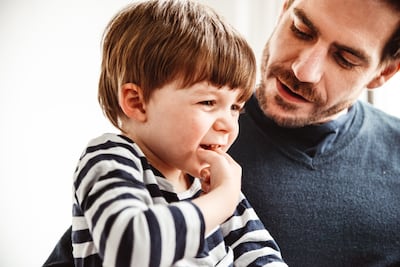Ice cream for breakfast. TV before bedtime. Blowing bubbles in the living room. These are all things that are absolutely not allowed in my household, where my husband and I are raising two young children aged two and five. Yet, contrary to popular belief, these rules are absolutely in keeping with the whole gentle parenting philosophy we choose to follow.
I’ve read a few articles in big-name publications recently about how Millennials and Gen Z parents are turning their back on the movement. But, instead of changing my mind, it’s made me realise that not many people actually understand what gentle parenting is all about. That belief has been compounded by outward criticism of my parenting style by seemingly well-meaning relatives who tend to assume I’m being “soft” or “need to say 'no' more” when I decide to try to cheer up my crying toddler with a cuddle instead of telling them off.
So, what exactly is gentle parenting? Well, I refer to it as somewhere “in between”. There’s authoritarian parenting, which revolves around punishments and more traditional behaviour modification, particularly when children are acting up or having meltdowns.
On the other end of the spectrum, there’s permissive parenting, where you essentially let your kids get away with whatever they want because you don’t have the energy to say no or you prefer to avoid conflict. And, so it seems, many have confused the latter with gentle parenting – but that’s exactly what it’s not.
“Gentle parenting’s philosophy centres around empathy, respect and healthy boundaries,” says Jasmine Collin, a parenting coach who created an online course on the subject I took when my now five-year-old daughter turned two. “It’s a relationship-centred approach that encourages co-operation over compliance, and connection over control. At its heart, gentle parenting is built on the belief that children are whole human beings – not future adults in training, but people worthy of respect right now.”
That doesn’t mean letting my daughter dictate that she’ll have Oreos whenever she wants them – but it might mean allowing her to decide whether she wants toast or a pre-approved type of cereal in the morning.
It doesn’t mean there are no consequences to her negative actions, either. But that won’t look like sitting on the “naughty step” or demanding she go to her room in a fit of rage; it’ll look more like holding space for her emotions and telling her it’s OK to feel her feelings, but that what she did still wasn’t right. Unless I lose my cool, of course – and that's OK, too, but I'll also apologise to them for that later.
Gentle parenting asks parents to examine their own reactions, regulate their emotions and lead with connection – which isn’t always easy or comfortable
Jasmine Collin,
parenting coach
“Gentle parenting can feel threatening to traditional parenting models that emphasise obedience, control or ‘tough love’,” says Collin. “For many, it challenges the way they were raised or how they’ve been told children should behave. It asks parents to examine their own reactions, regulate their emotions and lead with connection – which isn’t always easy or comfortable. So instead of being seen as a balanced and intentional approach, it can be dismissed or criticised, simply because it invites a shift away from what’s long been accepted as ‘normal’.”
Another UAE-based mum who sees the benefit is Rhiannon Downie, who grew up in a household where physical discipline was the norm. “I’ve noticed that when I react with aggression or lose my temper, it only fuels my son’s temper,” she tells The National. “It also sends the wrong message. If I can’t regulate my own emotions, how can I expect him to?”
Again, Downie is quick to clarify that doesn’t mean her son is allowed to do whatever he wants. “My husband and I try to be as gentle as possible in our parenting, but that doesn’t mean there’s no discipline. We have rules, there are consequences for actions, and I’ve definitely lost my cool on more than one occasion,” she admits. “I’m only human and I do get triggered easily. But, I’d much rather communicate calmly with my child than scream, shout or resort to violence. That approach helps no one, including me.”
No one’s perfect all the time, but people also seem to believe gentle parenting is about always staying calm, says Collin. “This myth puts a lot of pressure on parents and is totally unrealistic. Gentle parenting doesn’t expect perfection – it encourages repair when we mess up and models emotional honesty. It’s about progress, not perfection and role modelling what it is to be human, flaws and all.”
As for discipline, it prioritises teaching over punishing. It’s not a permanent “yes day”, as many critics might believe. “Permissive parenting can look similar, but it tends to lack boundaries,” Collin explains. “It often comes from a loving place, but it avoids conflict and lacks consistency. A permissive parent may struggle to say ‘no' because they don’t know how to deal with the children’s reaction. They often lack the tools and ability to stay calm and respond positively or they believe kindness means giving in to the child’s demands.”
But giving in to a child’s every demand is not kind. Setting clear, consistent boundaries is how kids thrive – as long as they’re delivered with empathy and respect rather than fear and shame, adds Collin. And these boundaries can look different from family to family, depending on their values.
For example, my husband values tidiness, so our kids are often reminded to clear up after themselves. There might be tears at first, and it might take a bit longer when dealing with subsequent tantrums calmly instead of demanding it happen immediately, “or else”, but the results are undeniable – and they have a far more long-term impact.
Deeper trust and communication, healing dysfunctional generational patterns, a stronger internal sense of identity and self-worth – these are all proven benefits of gentle parenting, according to the research, adds Collins.
At the end of the day, children learn by watching. “When we manage our emotions, apologise when we mess up and treat others with kindness, we’re teaching powerful life lessons,” says Collin. “I wish all parents knew that they only have to behave in ways they want their children to behave to raise kind and considerate grown-ups.”
The biog
Favourite car: Ferrari
Likes the colour: Black
Best movie: Avatar
Academic qualifications: Bachelor’s degree in media production from the Higher Colleges of Technology and diploma in production from the New York Film Academy
Tomb%20Raider%20I%E2%80%93III%20Remastered
%3Cp%3EDeveloper%3A%20Aspyr%0D%3Cbr%3EPublisher%3A%20Aspyr%0D%3Cbr%3EConsole%3A%20Nintendo%20Switch%2C%20PlayStation%204%26amp%3B5%2C%20PC%20and%20Xbox%20series%20X%2FS%0D%3Cbr%3ERating%3A%203%2F5%3C%2Fp%3E%0A
Results
5pm: Maiden (PA) Dh80,000 (Turf) 1,200m, Winner: ES Rubban, Antonio Fresu (jockey), Ibrahim Aseel (trainer)
5.30pm: Handicap (PA) Dh85,000 (T) 1,200m, Winner: Al Mobher, Sczcepan Mazur, Ibrahim Al Hadhrami
6pm: Handicap (PA) Dh80,000 (T) 2,200m, Winner: Jabalini, Tadhg O’Shea, Ibrahim Al Hadhrami
6.30pm: Wathba Stallions Cup (PA) Dh70,000 (T) 2,200m, Winner: AF Abahe, Tadgh O’Shea, Ernst Oertel
7pm: Handicap (PA) Dh85,000 (T) 1,600m, Winner: AF Makerah, Tadhg O’Shea, Ernst Oertel
7.30pm: Maiden (TB) Dh80,000 (T) 1,600m, Winner: Law Of Peace, Tadhg O’Shea, Satish Seemar
'I Want You Back'
Director:Jason Orley
Stars:Jenny Slate, Charlie Day
Rating:4/5
COMPANY%20PROFILE
%3Cp%3E%3Cstrong%3EName%3A%20%3C%2Fstrong%3ESmartCrowd%0D%3Cbr%3E%3Cstrong%3EStarted%3A%20%3C%2Fstrong%3E2018%0D%3Cbr%3E%3Cstrong%3EFounder%3A%20%3C%2Fstrong%3ESiddiq%20Farid%20and%20Musfique%20Ahmed%0D%3Cbr%3E%3Cstrong%3EBased%3A%20%3C%2Fstrong%3EDubai%0D%3Cbr%3E%3Cstrong%3ESector%3A%20%3C%2Fstrong%3EFinTech%20%2F%20PropTech%0D%3Cbr%3E%3Cstrong%3EInitial%20investment%3A%20%3C%2Fstrong%3E%24650%2C000%0D%3Cbr%3E%3Cstrong%3ECurrent%20number%20of%20staff%3A%3C%2Fstrong%3E%2035%0D%3Cbr%3E%3Cstrong%3EInvestment%20stage%3A%20%3C%2Fstrong%3ESeries%20A%0D%3Cbr%3E%3Cstrong%3EInvestors%3A%20%3C%2Fstrong%3EVarious%20institutional%20investors%20and%20notable%20angel%20investors%20(500%20MENA%2C%20Shurooq%2C%20Mada%2C%20Seedstar%2C%20Tricap)%3C%2Fp%3E%0A
What can victims do?
Always use only regulated platforms
Stop all transactions and communication on suspicion
Save all evidence (screenshots, chat logs, transaction IDs)
Report to local authorities
Warn others to prevent further harm
Courtesy: Crystal Intelligence
RUGBY CHAMPIONSHIP FIXTURES
September 30
South Africa v Australia
Argentina v New Zealand
October 7
South Africa v New Zealand
Argentina v Australia
Director: Laxman Utekar
Cast: Vicky Kaushal, Akshaye Khanna, Diana Penty, Vineet Kumar Singh, Rashmika Mandanna
Rating: 1/5
Bio
Age: 25
Town: Al Diqdaqah – Ras Al Khaimah
Education: Bachelors degree in mechanical engineering
Favourite colour: White
Favourite place in the UAE: Downtown Dubai
Favourite book: A Life in Administration by Ghazi Al Gosaibi.
First owned baking book: How to Be a Domestic Goddess by Nigella Lawson.
The language of diplomacy in 1853
Treaty of Peace in Perpetuity Agreed Upon by the Chiefs of the Arabian Coast on Behalf of Themselves, Their Heirs and Successors Under the Mediation of the Resident of the Persian Gulf, 1853
(This treaty gave the region the name “Trucial States”.)
We, whose seals are hereunto affixed, Sheikh Sultan bin Suggar, Chief of Rassool-Kheimah, Sheikh Saeed bin Tahnoon, Chief of Aboo Dhebbee, Sheikh Saeed bin Buyte, Chief of Debay, Sheikh Hamid bin Rashed, Chief of Ejman, Sheikh Abdoola bin Rashed, Chief of Umm-ool-Keiweyn, having experienced for a series of years the benefits and advantages resulting from a maritime truce contracted amongst ourselves under the mediation of the Resident in the Persian Gulf and renewed from time to time up to the present period, and being fully impressed, therefore, with a sense of evil consequence formerly arising, from the prosecution of our feuds at sea, whereby our subjects and dependants were prevented from carrying on the pearl fishery in security, and were exposed to interruption and molestation when passing on their lawful occasions, accordingly, we, as aforesaid have determined, for ourselves, our heirs and successors, to conclude together a lasting and inviolable peace from this time forth in perpetuity.
Taken from Britain and Saudi Arabia, 1925-1939: the Imperial Oasis, by Clive Leatherdale
PLAY-OFF%20DRAW
%3Cp%3EBarcelona%20%20v%20Manchester%20United%0D%3Cbr%3E%0D%3Cbr%3EJuventus%20v%20Nantes%20%0D%3Cbr%3E%0D%3Cbr%3ESporting%20Lisbon%20v%20Midtjylland%20%0D%3Cbr%3E%0D%3Cbr%3EShakhtar%20Donetsk%20v%20Rennes%20%0D%3Cbr%3E%0D%3Cbr%3EAjax%20v%20Union%20Berlin%0D%3Cbr%3E%0D%3Cbr%3EBayer%20Leverkusen%20v%20Monaco%20%0D%3Cbr%3E%0D%3Cbr%3ESevilla%20v%20PSV%20Eindhoven%0D%3Cbr%3E%0D%3Cbr%3ESalzburg%20v%20Roma%3C%2Fp%3E%0A
Fixtures
Friday Leganes v Alaves, 10.15pm; Valencia v Las Palmas, 12.15am
Saturday Celta Vigo v Real Sociedad, 8.15pm; Girona v Atletico Madrid, 10.15pm; Sevilla v Espanyol, 12.15am
Sunday Athletic Bilbao v Getafe, 8.15am; Barcelona v Real Betis, 10.15pm; Deportivo v Real Madrid, 12.15am
Monday Levante v Villarreal, 10.15pm; Malaga v Eibar, midnight
GAC GS8 Specs
Engine: 2.0-litre 4cyl turbo
Power: 248hp at 5,200rpm
Torque: 400Nm at 1,750-4,000rpm
Transmission: 8-speed auto
Fuel consumption: 9.1L/100km
On sale: Now
Price: From Dh149,900
Company Profile:
Name: The Protein Bakeshop
Date of start: 2013
Founders: Rashi Chowdhary and Saad Umerani
Based: Dubai
Size, number of employees: 12
Funding/investors: $400,000 (2018)
Specs
Engine: Electric motor generating 54.2kWh (Cooper SE and Aceman SE), 64.6kW (Countryman All4 SE)
Power: 218hp (Cooper and Aceman), 313hp (Countryman)
Torque: 330Nm (Cooper and Aceman), 494Nm (Countryman)
On sale: Now
Price: From Dh158,000 (Cooper), Dh168,000 (Aceman), Dh190,000 (Countryman)
NINE WINLESS GAMES
Arsenal 2-2 Crystal Palace (Oct 27, PL)
Liverpool 5-5 Arsenal (Oct 30, EFL)
Arsenal 1-1 Wolves (Nov 02, PL)
Vitoria Guimaraes 1-1 Arsenal (Nov 6, Europa)
Leicester 2-0 Arsenal (Nov 9, PL)
Arsenal 2-2 Southampton (Nov 23, PL)
Arsenal 1-2 Eintracht Frankfurt (Nov 28, Europa)
Norwich 2-2 Arsenal (Dec 01, PL)
Arsenal 1-2 Brighton (Dec 05, PL)
The specs
Engine: 2.0-litre 4cyl turbo
Power: 261hp at 5,500rpm
Torque: 405Nm at 1,750-3,500rpm
Transmission: 9-speed auto
Fuel consumption: 6.9L/100km
On sale: Now
Price: From Dh117,059
Ferrari 12Cilindri specs
Engine: naturally aspirated 6.5-liter V12
Power: 819hp
Torque: 678Nm at 7,250rpm
Price: From Dh1,700,000
Available: Now
More on animal trafficking
Mohammed bin Zayed Majlis
Key figures in the life of the fort
Sheikh Dhiyab bin Isa (ruled 1761-1793) Built Qasr Al Hosn as a watchtower to guard over the only freshwater well on Abu Dhabi island.
Sheikh Shakhbut bin Dhiyab (ruled 1793-1816) Expanded the tower into a small fort and transferred his ruling place of residence from Liwa Oasis to the fort on the island.
Sheikh Tahnoon bin Shakhbut (ruled 1818-1833) Expanded Qasr Al Hosn further as Abu Dhabi grew from a small village of palm huts to a town of more than 5,000 inhabitants.
Sheikh Khalifa bin Shakhbut (ruled 1833-1845) Repaired and fortified the fort.
Sheikh Saeed bin Tahnoon (ruled 1845-1855) Turned Qasr Al Hosn into a strong two-storied structure.
Sheikh Zayed bin Khalifa (ruled 1855-1909) Expanded Qasr Al Hosn further to reflect the emirate's increasing prominence.
Sheikh Shakhbut bin Sultan (ruled 1928-1966) Renovated and enlarged Qasr Al Hosn, adding a decorative arch and two new villas.
Sheikh Zayed bin Sultan (ruled 1966-2004) Moved the royal residence to Al Manhal palace and kept his diwan at Qasr Al Hosn.
Sources: Jayanti Maitra, www.adach.ae
MOUNTAINHEAD REVIEW
Starring: Ramy Youssef, Steve Carell, Jason Schwartzman
Director: Jesse Armstrong
Rating: 3.5/5
RESULTS
Catchweight 63.5kg: Shakriyor Juraev (UZB) beat Bahez Khoshnaw (IRQ). Round 3 TKO (body kick)
Lightweight: Nart Abida (JOR) beat Moussa Salih (MAR). Round 1 by rear naked choke
Catchweight 79kg: Laid Zerhouni (ALG) beat Ahmed Saeb (IRQ). Round 1 TKO (punches)
Catchweight 58kg: Omar Al Hussaini (UAE) beat Mohamed Sahabdeen (SLA) Round 1 rear naked choke
Flyweight: Lina Fayyad (JOR) beat Sophia Haddouche (ALG) Round 2 TKO (ground and pound)
Catchweight 80kg: Badreddine Diani (MAR) beat Sofiane Aïssaoui (ALG) Round 2 TKO
Flyweight: Sabriye Sengul (TUR) beat Mona Ftouhi (TUN). Unanimous decision
Middleweight: Kher Khalifa Eshoushan (LIB) beat Essa Basem (JOR). Round 1 rear naked choke
Heavyweight: Mohamed Jumaa (SUD) beat Hassen Rahat (MAR). Round 1 TKO (ground and pound)
Lightweight: Abdullah Mohammad Ali Musalim (UAE beat Omar Emad (EGY). Round 1 triangle choke
Catchweight 62kg: Ali Taleb (IRQ) beat Mohamed El Mesbahi (MAR). Round 2 KO
Catchweight 88kg: Mohamad Osseili (LEB) beat Samir Zaidi (COM). Unanimous decision
More from Rashmee Roshan Lall
START-UPS%20IN%20BATCH%204%20OF%20SANABIL%20500'S%20ACCELERATOR%20PROGRAMME
%3Cp%3E%3Cstrong%3ESaudi%20Arabia%3C%2Fstrong%3E%3C%2Fp%3E%0A%3Cp%3E%3Cstrong%3EJoy%3A%3C%2Fstrong%3E%20Delivers%20car%20services%20with%20affordable%20prices%3C%2Fp%3E%0A%3Cp%3E%3Cstrong%3EKaraz%3A%3C%2Fstrong%3E%20Helps%20diabetics%20with%20gamification%2C%20IoT%20and%20real-time%20data%3C%2Fp%3E%0A%3Cp%3E%3Cstrong%3EMedicarri%3A%3C%2Fstrong%3E%20Medical%20marketplace%20that%20connects%20clinics%20with%20suppliers%3C%2Fp%3E%0A%3Cp%3E%3Cstrong%3EMod5r%3C%2Fstrong%3E%3A%20Makes%20automated%20and%20recurring%20investments%20to%20grow%20wealth%3C%2Fp%3E%0A%3Cp%3E%3Cstrong%3EStuck%3A%3C%2Fstrong%3E%20Live%2C%20on-demand%20language%20support%20to%20boost%20writing%3C%2Fp%3E%0A%3Cp%3E%3Cstrong%3EWalzay%3A%3C%2Fstrong%3E%20Helps%20in%20recruitment%20while%20reducing%20hiring%20time%3C%2Fp%3E%0A%3Cp%3E%3Cstrong%3EUAE%3C%2Fstrong%3E%3C%2Fp%3E%0A%3Cp%3E%3Cstrong%3EEighty6%3A%20%3C%2Fstrong%3EMarketplace%20for%20restaurant%20and%20supplier%20procurements%3C%2Fp%3E%0A%3Cp%3E%3Cstrong%3EFarmUnboxed%3A%20%3C%2Fstrong%3EHelps%20digitise%20international%20food%20supply%20chain%3C%2Fp%3E%0A%3Cp%3E%3Cstrong%3ENutriCal%3A%3C%2Fstrong%3E%20Helps%20F%26amp%3BB%20businesses%20and%20governments%20with%20nutritional%20analysis%3C%2Fp%3E%0A%3Cp%3E%3Cstrong%3EWellxai%3A%3C%2Fstrong%3E%20Provides%20insurance%20that%20enables%20and%20rewards%20user%20habits%3C%2Fp%3E%0A%3Cp%3E%3Cstrong%3EEgypt%3C%2Fstrong%3E%3C%2Fp%3E%0A%3Cp%3E%3Cstrong%3EAmwal%3A%3C%2Fstrong%3E%20A%20Shariah-compliant%20crowd-lending%20platform%3C%2Fp%3E%0A%3Cp%3E%3Cstrong%3EDeben%3A%3C%2Fstrong%3E%20Helps%20CFOs%20manage%20cash%20efficiently%3C%2Fp%3E%0A%3Cp%3E%3Cstrong%3EEgab%3A%3C%2Fstrong%3E%20Connects%20media%20outlets%20to%20journalists%20in%20hard-to-reach%20areas%20for%20exclusives%3C%2Fp%3E%0A%3Cp%3E%3Cstrong%3ENeqabty%3A%3C%2Fstrong%3E%20Digitises%20financial%20and%20medical%20services%20of%20labour%20unions%3C%2Fp%3E%0A%3Cp%3E%3Cstrong%3EOman%3C%2Fstrong%3E%3C%2Fp%3E%0A%3Cp%3E%3Cstrong%3EMonak%3A%3C%2Fstrong%3E%20Provides%20financial%20inclusion%20and%20life%20services%20to%20migrants%3C%2Fp%3E%0A
Our legal columnist
Name: Yousef Al Bahar
Advocate at Al Bahar & Associate Advocates and Legal Consultants, established in 1994
Education: Mr Al Bahar was born in 1979 and graduated in 2008 from the Judicial Institute. He took after his father, who was one of the first Emirati lawyers
LEAGUE CUP QUARTER-FINAL DRAW
Stoke City v Tottenham
Brentford v Newcastle United
Arsenal v Manchester City
Everton v Manchester United
All ties are to be played the week commencing December 21.
UAE currency: the story behind the money in your pockets
Specs
Engine: Dual-motor all-wheel-drive electric
Range: Up to 610km
Power: 905hp
Torque: 985Nm
Price: From Dh439,000
Available: Now
Who has lived at The Bishops Avenue?
- George Sainsbury of the supermarket dynasty, sugar magnate William Park Lyle and actress Dame Gracie Fields were residents in the 1930s when the street was only known as ‘Millionaires’ Row’.
- Then came the international super rich, including the last king of Greece, Constantine II, the Sultan of Brunei and Indian steel magnate Lakshmi Mittal who was at one point ranked the third richest person in the world.
- Turkish tycoon Halis Torprak sold his mansion for £50m in 2008 after spending just two days there. The House of Saud sold 10 properties on the road in 2013 for almost £80m.
- Other residents have included Iraqi businessman Nemir Kirdar, singer Ariana Grande, holiday camp impresario Sir Billy Butlin, businessman Asil Nadir, Paul McCartney’s former wife Heather Mills.
Hunting park to luxury living
- Land was originally the Bishop of London's hunting park, hence the name
- The road was laid out in the mid 19th Century, meandering through woodland and farmland
- Its earliest houses at the turn of the 20th Century were substantial detached properties with extensive grounds
The%20specs
%3Cp%3E%3Cstrong%3EPowertrain%3A%20%3C%2Fstrong%3ESingle%20electric%20motor%0D%3Cbr%3E%3Cstrong%3EPower%3A%20%3C%2Fstrong%3E201hp%0D%3Cbr%3E%3Cstrong%3ETorque%3A%20%3C%2Fstrong%3E310Nm%0D%3Cbr%3E%3Cstrong%3ETransmission%3A%20%3C%2Fstrong%3ESingle-speed%20auto%0D%3Cbr%3E%3Cstrong%3EBattery%3A%20%3C%2Fstrong%3E53kWh%20lithium-ion%20battery%20pack%20(GS%20base%20model)%3B%2070kWh%20battery%20pack%20(GF)%0D%3Cbr%3E%3Cstrong%3ETouring%20range%3A%20%3C%2Fstrong%3E350km%20(GS)%3B%20480km%20(GF)%0D%3Cbr%3E%3Cstrong%3EPrice%3A%20%3C%2Fstrong%3EFrom%20Dh129%2C900%20(GS)%3B%20Dh149%2C000%20(GF)%0D%3Cbr%3E%3Cstrong%3EOn%20sale%3A%3C%2Fstrong%3E%20Now%3C%2Fp%3E%0A






